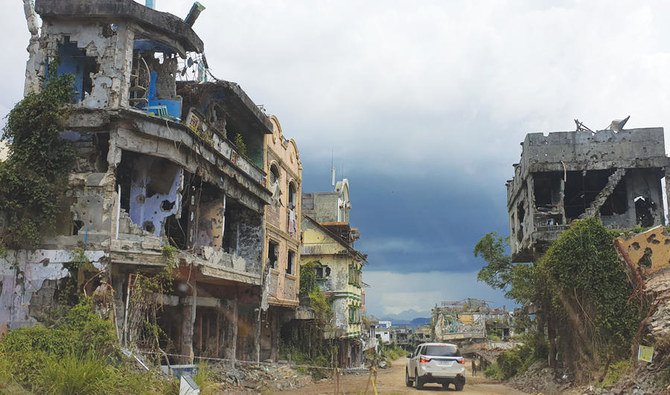Philippine military takes new tack in fighting extremists

Two years after Daesh-inspired militants besieged Marawi city, leading to a five-month bloody war that left the core of the city in a shambles, the military is taking a new tack to fight terrorists and extremist groups.
Armed with tractors instead of tanks, dropping seeds instead of bombs, soldiers led by Brig. Gen. Romeo Brawner Jr., commander, Army 103rd Brigade, visit Dawlah Islamiyah-Lanao (DI-Lanao)-influenced villages in Lanao Del Sur to reach out to communities.
One of the areas recently visited by the soldiers was Padas village in Pagayawan town, site of an encounter in March between government troops and the DI-Lanao (former Maute group) and home to the 101st Moro Islamic Liberation Front (MILF) Base Command.
Brawner said it was during the encounter in Pagayawan that Owayda Abdul Najid Marohombsar, alias “Abu Dar,” the remaining leader of DI-Lanao, was killed. Dar was also the former lieutenant of Isnilon Hapilon, a US-designated terrorist who led a faction of the Abu Sayyaf Group (ASG), together with Omarkhayam Maute of the Maute Group that took Marawi City by force in May 2017.
On June 8, Brawner and his troops returned to Padas village. This time their mission was to conduct a series of peace-building activities in cooperation with the MILF 101st BC.
Activities include providing medical services and distributing relief goods, gift packs to children, seeds and seedlings for planting; and a dialogue with the community.
The highlight was the installation of the first playground equipment in the village, with some of the former MILF fighters being the first to try the seesaw.
Brawner said that the playground set would provide young members of the MILF community with an avenue for cohesive and positive social engagements instead of divisive and potentially vicious activities that could pull them into violent extremism.
Soldiers and MILF commanders in the area also ate side by side during the boodlefight, a cherished tradition in the Philippines military symbolizing camaraderie.
“It’s part of our confidence-building measures with the MILF. They should be our partners,” Brawner said. The MILF used to be the largest Muslim rebel group in the Philippines but has since made peace with the government.
Brawner, however, said that during the profiling of Maute Group fighters who had surrendered to the military it was noted that some of them were former MILF members prior to joining the Daesh-inspired group.
The village they visited in Pagayawan was solely an MILF community and also where Dar sought refuge before he was killed by government forces.
“During our interactions with the community, particularly with the MILF commanders there, they gave us assurance that it will not happen again, the coddling of DI-Lanao or Maute militants,” Brawner said.
Three DI-Lanao members from the area have recently surrendered to the military, but there are five more Daesh-inspired militants hiding in Pagayawan. The MILF has committed to help convince them to surrender.
“Pagayawan and Sultan Dumalandong are DI-Lanao influenced. Our purpose in going there was to reach out to the communities. It’s all part of our building confidence-building measures to prevent the occurrence of violent extremism,” Brawner said.
Many of the former Maute Group members who have surrendered were also farmers who were lured into becoming jihadists aligned with Daesh. The military is now helping them to cultivate their land by lending tractors and giving them seeds and seedlings to plant.
Marawi ruins
When President Rodrigo Duterte declared the liberation of Marawi following the death of Hapilon and Omarkhayam Maute in October 2018, he also announced “the beginning of the rehabilitation of the city.”
However, evidence of the fierce fighting persists, particularly in the “most affected area” (MAA) of the siege. While life is now back to normal outside of ground zero, the MAA remains abandoned.
The deep scars left by the 2017 conflict continue to haunt more than 100,000 people who still do not have a home to return to and have grown frustrated by what they see as slow progress in the rehabilitation of the city.
Some of the displaced residents have been living with relatives or are in evacuation centers and transition sites where they struggle for access to drinkable water and viable livelihoods.
Amid the growing frustration of displaced residents, Housing and Urban Development Coordinating Council and Task Force Bangon Marawi Chairman Eduardo del Rosario assured the people of Marawi that it will rise as a prosperous city again.
He explained that currently the main challenge of the rehabilitation program was clearing unexploded explosives and ordinances. Bombs planted by the militants have a 650-meter blast radius — potentially wiping out all of the buildings in the area.
Del Rosario said once all debris management work was completed by November, the construction of vertical infrastructure would begin.
Decisive victory
Brawner said that the end of the Marawi siege was a decisive military victory. Because of the campaign against extremists, Daesh was unable to establish a caliphate in the country and in Southeast Asia.
He added that the DI-Lanao, from a maximum number of about 1,000 fighters, were down to 25 and had been leaderless since the death of Dar.
On concerns that the militants could use the frustration of residents as a tool to recruit new fighters, Brawner said there had been attempts but Daesh-inspired groups had been unable to convince potential recruits.
“I think the people are now aware that even if they are victims, this is not the right way to do it, attacking the community. It’s unIslamic,” Brawner said.
“In fact we have to prepare the community because the people here are saying if they see the rebels, even if they have surrendered already, they themselves will kill them because they believe these rebels were the ones responsible for destroying Marawi City,” Brawner said.
